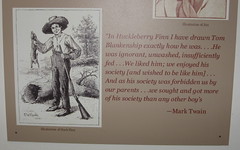 My ten year-old came home from school the other day with an assignment from his teacher: to write an original story based around the concept of a “ship wreck.”
My ten year-old came home from school the other day with an assignment from his teacher: to write an original story based around the concept of a “ship wreck.”
He promptly sat down at the dinner table and began composing his opus. It was the story of a “tan skinned” pirate of Somali origin who hijacks a boat with an AK-47. In broken English, the pirate threatens all the passengers on the ship with his weapon. Then they die.
When my son showed me his essay afterwards, I was mortified. “You can’t write this!” I exclaimed. “You sound like a racist!” I then forced him to expurgate the most offensive passages from his text, including the color of the pirate’s skin and the derogatory description of his accent.
But when I recounted this story to an English friend of mine, she just shook her head. “Oh you Americans!” she said, laughing. “You’re so hung up on political correctness! An English teacher would neither notice nor care about any of this. Lighten up!”
I was reminded of this vignette earlier this week when I read that a new edition of Mark Twain’s classic novel The Adventures of Huckleberry Finn is coming out in February. In the new version, all instances of the N-word – which appears more than 200 times in the book – are to be expunged. In its place, the book will employ the term “slave.” (“Injun” – a derogatory term for Native Americans – will also be replaced by “Indian.”)
Read the rest of this story at www.PoliticsDaily.com…
Image: Huck Finn by CaZaTo Ma via Flickr under a Creative Commons license.













January 7, 2011, 3:53 pm
Literature is history, and history is our most important teacher. It would make me very nervous to put our books through “filters” like that. It’s not that far of a stretch from the sanitized history books I studied as a kid, where the “Indians” were portrayed as the bad guys, or the books my Japanese husband read, where the Nanking Massacre never occurred.
January 7, 2011, 4:52 pm
I am afraid that changing the words of the novel may completely change its message. Isn’t it better to explain the meaning of the word to children so that they understand they should avoid using it in real life?
January 7, 2011, 8:37 pm
1.) America does indeed have a legacy of racism that we have – never to this day – come to terms of.
2.) But – “Mark Twain” as to the “expurgated” edition of Huckleberry Finn at your son’s school:
A.) America does no part of it at all. It is much less well known of Twain that in a review of his personal letters by a researcher about ten years ago a letter to this effect (and I am almost – but certainly not exactly – as this is from memory) quoting Twain verbatim):
“Yes, I am going to pay the tuition of this young man to attend the Yale Law School out of my own pocket. I would be very slow to do this for a white man – but I would do it for a black man because (the United States) has almost ground the manhood out of this race and all of us in this country owe the black race a debt that we cannot ever repay.”
Moreover, as anyone who has ever read “Huckleberry Finn” should know, “Nigger Jim” is more (and a better) father to young Huck than his alcoholic and absconding “real” father ever was. And the British, particularly, should consider Twain’s cogent attack on the entire European class system with his satire of the “Duke” and the other fraud who travel around the South ripping off credulous white townsfolk – and – the “Duke” and his associate are meant to represent actual – not – “pretend” titled European nobility with all their foibles and pretensions.
3.) Lastly, the notion that Huckleberry Finn should have the “N” word censored from its new edition (and actually it has been censored in many prior editions in the United States for years) is both absurd and anti-educational. Children’s books are always the – first – targets of censors but it is precisely children who should be exposed to the full truth about our historical past – and they are quite often better judges of who and what was wrong with our history than many adults. And “Huckleberry Finn” will never lead them astray on that score – or what the real human values we should share should be.
January 8, 2011, 1:33 pm
Would love to read the bulk of the story on PD, but alas (this is a first) I can’t access the PD part. I clicked on the link, as always, but no go. ???
January 8, 2011, 1:52 pm
Reply 2: Finally accessed the full PD piece. Your point (& that of the Auburn Professor)is only too well taken, but. . . I took Shakespeare in college (!) from an elderly & prissy professor who insisted on reading Othello aloud to us & bowdlerizing every sexual (lots in O.!) while we stared at the actual texts in our copies.
I think that were I teaching middle school pupils (I was 12 when it became the best book I ever read), I would give them the option of not reading it at all if the N word freaked them or reading it with preliminary instruction about the actual state of the US in the 1830’s & “40s. This brouhaha reminds me of the pietistic reading of what was announced as the “whole” Constitution by the new House of Reps. Reps. They censored the part which described a Negro as 3/5ths of a human being.
January 10, 2011, 2:03 am
Censorshipwreck.